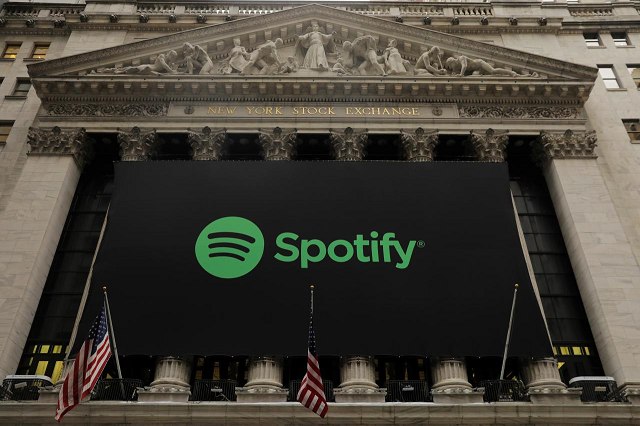Spotify buys 'cover song' licensing firm to tackle copyright risks
The acquisition helps address a major weakness the company has warned exists in its business model

The Spotify logo hangs on the facade of the New York Stock Exchange in New York, US, April 3, 2018.
PHOTO: REUTERS
The acquisition helps address a major weakness Spotify has warned exists in its business model, namely locating and ensuring the right artists get paid for their copyrighted work, an issue which, left unaddressed, leaves it open to lawsuits.
Financial terms of the deal, the first since it began trading on the New York Stock Exchange earlier this month, were not disclosed.
Spotify listing could be roller coaster for retail investors
Spotify was hit late last year with a lawsuit seeking damages of up to $1.6 billion by Wixen Publishing, a California-based company that represents artists including Tom Petty, Neil Young, Rage Against the Machine and Missy Elliott.
Loudr was set up in 2013 by its three co-founders to simplify the process for musicians who publicly perform songs by other artists to identify, track and pay royalties for so-called “mechanical licenses” owed to music publishers. These may include cover versions of songs, samples, remixes or medleys.
Spotify soars in $26 billion stock debut
The company offers a system for automatically acquiring mechanical licenses under US copyright laws, which do not require musicians to engage in up-front licensing negotiations before performing songs by other artists. Charges for licenses range from $35 for electronic filings to $85 for paper ones.
Loudr will relocate to Spotify’s offices in New York, the company said in a blog post.
Spotify has made at least ten modest, typically technology-focused acquisitions in recent years to improve its service.
Shares of Spotify closed at $149.10, little changed on the day.


















COMMENTS
Comments are moderated and generally will be posted if they are on-topic and not abusive.
For more information, please see our Comments FAQ